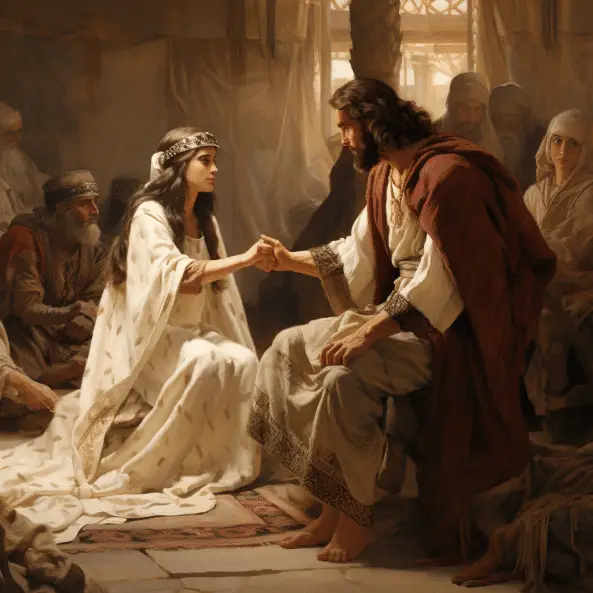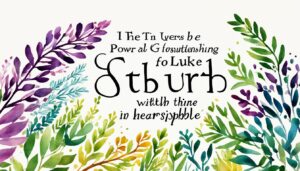
Many people wonder about the longest verse in the Bible and are curious to know more about Esther 8:9. This verse, found in the book of Esther, is commonly believed to be the longest Bible verse. It holds a significant place in biblical literature and has sparked interest and discussion among scholars and believers alike.

Key Takeaways:
- Esther 8:9 is commonly believed to be the longest Bible verse.
- The longest verse can vary depending on the language and translation used.
- In the English Standard Version (ESV) translation, Esther 8:9 has 80 words.
- Revelation 20:4 holds the record for the longest verse in the original languages with 58 words.
- The division of verses in the Bible was added for convenience and has no doctrinal significance.
The Length of Esther 8:9
Esther 8:9 holds the distinction of being one of the longest verses in the Bible, consisting of 80 words in the English Standard Version translation. This verse, found in the book of Esther, is a powerful testament to the detailed and intricate nature of biblical literature. While Esther 8:9 is often cited as the longest verse, it is essential to note that the length of verses can vary depending on the language and translation used.
Revelation 20:4 holds the title for the longest verse in the original languages, with 58 words. However, in the English translation, it contains 75 words, making it another lengthy verse to consider. Additionally, there are other verses with significant word counts, such as Joshua 8:33, Ezekiel 48:21, Jeremiah 21:7, Jeremiah 44:12, and 2 Chronicles 2:14, all containing 68-74 words. These verses showcase the diversity of biblical literature and the range of word counts found within it.
The length of verses can be influenced by various factors. The author’s style plays a significant role; some authors may use longer verses to convey their message more elaborately, while others may prefer shorter, concise verses. Additionally, the genre of the text can also influence verse length. Narrative passages, for example, may contain shorter verses, while poetic sections often feature longer verses to maintain the rhythm and flow of the writing. It is important to note that the division of verses in the Bible was added for convenience and ease of reference, rather than for any doctrinal significance.
| Longest Verses | Word Count |
|---|---|
| Esther 8:9 | 80 |
| Revelation 20:4 | 75 |
| Joshua 8:33, Ezekiel 48:21, Jeremiah 21:7, Jeremiah 44:12 | 74 |
| 2 Chronicles 2:14 | 68 |
Long Verses in Different Translations
While Esther 8:9 is considered one of the longest verses in English translations, it is important to note that the length of verses can vary depending on the translation and the original languages. In the English Standard Version (ESV), Esther 8:9 contains 80 words, making it a significant passage in terms of its length. However, when we consider the original languages, the longest verse in the Bible is Revelation 20:4.
In the original Greek, Revelation 20:4 consists of 58 words, surpassing Esther 8:9 in word count. This verse is part of a larger passage discussing the souls of those who had been martyred for their faith. Its length adds to the depth and complexity of the message being conveyed. It is worth noting that the length of verses can significantly impact the reader’s interpretation and understanding of the biblical text.
Alongside Esther 8:9 and Revelation 20:4, there are several other long verses in the Bible. Some examples include Joshua 8:33 and Ezekiel 48:21, which both contain 74 words; Jeremiah 21:7 and Jeremiah 44:12, with 73 words; and 2 Chronicles 2:14, consisting of 68 words. These verses span different genres and offer unique insights into biblical narratives and teachings.
| Verse | Word Count |
|---|---|
| Esther 8:9 | 80 |
| Revelation 20:4 | 58 |
| Joshua 8:33 | 74 |
| Ezekiel 48:21 | 74 |
| Jeremiah 21:7 | 73 |
| Jeremiah 44:12 | 73 |
| 2 Chronicles 2:14 | 68 |
The length of verses can be influenced by various factors, including the author’s style and the genre of the text. Some authors may use longer verses to convey detailed narratives or complex theological concepts, while others may opt for shorter, concise verses. Additionally, the division of verses in the Bible, introduced for convenience in reading and referencing, does not hold any doctrinal significance.
The Longest Verse in the Bible
Original Revelation 20:4 includes 58 words, the longest Bible verse. Its length and theology make this poem notable. ESV Rev 20:4 “Then I saw thrones with judges on them. I also saw the souls of those beheaded for Jesus’ and God’s testimony and those who hadn’t worshipped the beast, its image, or its forehead or hand mark. Resurrected, they ruled with Christ for 1,000 years.”
The longest verse varies by language/translation. The longest verse in the original languages is Revelation 20:4 (58 words). English Standard Version Esther 8:9 comprises 80 words. Translations change verse length, which is intriguing.
Revelation 20:4 (75 words), Joshua 8:33, Ezekiel 48:21, Jeremiah 21:7, 44:12, and 2 Chronicles 2:14 are also lengthy. Bible literature is vast and diverse, as these verses show.
Author style and genre affect Bible verse length. Not doctrine, the Bible’s verse divisions were for convenience and reference. Studying verse length and substance may improve our appreciation of sacred literature.
| Longest Verses in the Bible | Word Count |
|---|---|
| Revelation 20:4 | 58 |
| Esther 8:9 | 80 |
| Revelation 20:4 | 75 |
| Joshua 8:33 / Ezekiel 48:21 | 74 |
| Jeremiah 21:7 / Jeremiah 44:12 | 73 |
| 2 Chronicles 2:14 | 68 |
Other Long Verses in the Bible
In addition to Esther 8:9 and Revelation 20:4, there are several other long verses in the Bible that span various literary genres. These verses showcase the diversity and richness of the biblical text, offering profound insights and teachings. Let’s explore some of these notable long verses:
Revelation 20:4
“Then I saw thrones, and seated on them were those to whom the authority to judge was committed. Also, I saw the souls of those who had been beheaded for the testimony of Jesus and for the word of God, and those who had not worshipped the beast or its image and had not received its mark on their foreheads or their hands. They came to life and reigned with Christ for a thousand years.”
With 75 words, Revelation 20:4 is not only the longest verse in the Bible but also offers a vivid depiction of the end times and the rewards for those faithful to God.
Joshua 8:33
And all Israel, sojourner as well as native born, with their elders and officers and their judges, stood on opposite sides of the ark before the Levitical priests who carried the ark of the covenant of the LORD, half of them in front of Mount Gerizim and half of them in front of Mount Ebal, just as Moses the servant of the LORD had commanded at the first, to bless the people of Israel.
This verse from the book of Joshua, with 74 words, describes a significant moment in Israel’s history when the people stood before the ark of the covenant to receive blessings according to God’s command.
Ezekiel 48:21
“The remainder shall be for the prince, on one side and on the other of the holy district and of the property of the city, in front of the twenty-five thousand cubits of the property as far as the east border, and westward in front of the twenty-five thousand, from the west border to the east border, parallel to one of the tribal portions; it shall be for the prince.”
A 74-word verse in Ezekiel 48:21 shows how the land was divided between Israel’s groups and the prince.
Jeremiah 21:7
Afterward, declares the LORD, I will give Zedekiah king of Judah and his servants and the people in this city who survive the pestilence, sword, and famine into the hand of Nebuchadnezzar king of Babylon and into the hand of their enemies, into the hand of those who seek their lives. He shall strike them down with the edge of the sword. He shall not pity them or spare them or have compassion.
This verse from the book of Jeremiah, with 73 words, speaks of the impending judgment and punishment upon the people of Judah at the hands of the Babylonian king Nebuchadnezzar.
2 Chronicles 2:14
“The son of a woman of the daughters of Dan, and his father was a man of Tyre. He is trained to work in gold, silver, bronze, iron, stone, and wood, and in purple, blue, and crimson fabrics and fine linen, and to do all sorts of engraving and execute any design that may be assigned him, with your craftsmen, the craftsmen of my lord, David your father.”
This verse, containing 68 words, describes the skills and craftsmanship of a skilled artisan tasked with constructing the temple during King Solomon’s reign.
| Verse | Word Count |
|---|---|
| Esther 8:9 | 80 |
| Revelation 20:4 | 75 |
| Joshua 8:33 | 74 |
| Ezekiel 48:21 | 74 |
| Jeremiah 21:7 | 73 |
| 2 Chronicles 2:14 | 68 |
Factors Influencing Verse Length
The length of Bible verses can be influenced by several factors, including the author’s writing style, the genre of the text, and the added verse divisions. These factors contribute to the varying lengths we find throughout biblical literature.
Firstly, the author’s writing style plays a significant role in determining verse length. Some authors, like the Apostle Paul, were known for their lengthy and complex sentences, resulting in longer verses. On the other hand, authors like King Solomon often employed concise and poetic language, leading to shorter verses.
The genre of the text also affects the length of verses. Narrative sections, such as historical accounts or stories, tend to have longer verses as they provide detailed descriptions and events. In contrast, poetic passages, like Psalms or Proverbs, often consist of shorter verses with rhythmic patterns and parallelism.
Additionally, the division of verses in the Bible was added for convenience and ease of reference. While these divisions allow for easier navigation and study, they do not always align with the natural flow of the original text. As a result, verse divisions can sometimes lead to variations in verse length.
| Verse | Word Count |
|---|---|
| Esther 8:9 (ESV) | 80 |
| Revelation 20:4 (Original Languages) | 58 |
| Revelation 20:4 (ESV) | 75 |
| Joshua 8:33 | 74 |
| Ezekiel 48:21 | 74 |
| Jeremiah 21:7 | 73 |
| Jeremiah 44:12 | 73 |
| 2 Chronicles 2:14 | 68 |
Summary
Various factors contribute to the length of Bible verses, including the author’s writing style, the genre of the text, and the added verse divisions. These factors result in variations in verse length throughout biblical literature. It is important to consider these influences when studying and interpreting the scriptures.
The Significance of Verse Length
Bible interpretation is not based on verse length, though it is intriguing. Bibles are enormous collections of religious books with unique literary styles and deep meanings. Bible verses, regardless of length, enrich the tale and spirituality.
The verse length disparities between native languages and translations are fascinating. Esther 8:9 is the longest ESV verse at 80 words. In the original languages, Revelation 20:4 is 58 words, showing its complexity.
Revelation 20:4 (75 words), Joshua 8:33 and Ezekiel 48:21 (74 words), Jeremiah 21:7 and 44:12 (73 words), and 2 Chronicles 2:14 (68 words) are other significant Bible verses. These prophesy, history, and wisdom texts demonstrate that duration is genre- and theme-neutral.
This is crucial: the Bible separated passages for convenience and reference. The divides do not change doctrine or text meaning. As biblical readers and interpreters, we should prioritize word meanings, morals, and spiritual insights over length.
| Verse | Translation | Word Count |
|---|---|---|
| Esther 8:9 | English Standard Version (ESV) | 80 |
| Revelation 20:4 | English Standard Version (ESV) | 58 |
| Joshua 8:33 | English Standard Version (ESV) | 74 |
| Ezekiel 48:21 | English Standard Version (ESV) | 74 |
| Jeremiah 21:7 | English Standard Version (ESV) | 73 |
The Profound Meaning of Esther 8:9
Esther 8:9 conveys great biblical knowledge. This verse from Esther is dear to believers and shows the Bible’s richness and depth. Explore Esther 8:9’s tremendous meaning and lessons.
This verse depicts a pivotal biblical event. Jewish queen Esther begs King Xerxes to reverse an edict that endangered her people. Esther’s deeds and courage add meaning to the words. She shows selflessness, devotion, and faith by risking her life for her people.
The message of Esther 8:9 transcends its historical context. It proves how important it is to always do the right thing. It makes people want to fight for health and fairness. Christians should always remember that they can get spiritual help, even when things are hard. Having faith in God’s care is also important.
The Role of Esther 8:9 in Biblical Literature
Esther 8:9 holds a unique place within biblical literature. It serves as a reminder of the many stories and teachings found within the sacred scriptures, each offering insights into the human experience and the relationship between humanity and the divine. As believers reflect on Esther 8:9, they recognize its significance in the Christian faith. It serves as an inspiration and a call to action, encouraging individuals to demonstrate the same level of courage, faith, and selflessness displayed by Queen Esther. This profound verse provides spiritual guidance and serves as a testament to the timeless wisdom found within the Bible.
| Verse | Word Count |
|---|---|
| Esther 8:9 (ESV) | 80 |
| Revelation 20:4 (ESV) | 75 |
| Joshua 8:33 (ESV) | 74 |
| Ezekiel 48:21 (ESV) | 74 |
| Jeremiah 21:7 (ESV) | 73 |
As we plunge into the complicated tapestry of the Bible, we learn that the length of passages can vary greatly. Other big verses, such as Revelation 20:4 with 75 words, Joshua 8:33 and Ezekiel 48:21 with 74 words, and Jeremiah 21:7 with 73 words, highlight key periods in biblical history. This variance in verse length reflects the different nature of the Bible itself, containing numerous genres and writing styles.
It is vital to understand that the division of verses in the Bible was intended for convenience and simplicity of reference. While the length of verses can include symbolic importance within specific settings, it does not necessarily hold theological consequences. Instead, the real worth is in the message and teachings embedded within each verse, offering direction, knowledge, and spiritual insight to Christians.
| Verse | Word Count |
|---|---|
| Jeremiah 44:12 (ESV) | 73 |
| 2 Chronicles 2:14 (ESV) | 68 |
The Unique Place of Esther 8:9 in Biblical Literature
Esther 8:9 is unique in biblical literature, providing spiritual advice and deepening Christian understanding. This line comes from Esther, the story of a Jewish queen who risked her life to save her people. Esther 8:9 is a turning moment in the story, favoring the Jews.
Esther 8:9 shows Christians the power of faith and fortitude under adversity. This verse reminds us that God’s timing and providence operate even in grave situations. It urges people to trust in God, do the right thing, and fight for the underprivileged.
Furthermore, Esther 8:9 shows the durability of biblical writing. It displays generations-old stories, parables, and teachings. These scriptures guide believers morally and inspire them daily. The profound principles of Esther 8:9 and the Bible continue to comfort, teach, and link readers to Christianity.
| Verse | Word Count |
|---|---|
| Esther 8:9 (ESV) | 80 words |
| Revelation 20:4 (ESV) | 75 words |
| Joshua 8:33 (ESV) | 74 words |
| Ezekiel 48:21 (ESV) | 74 words |
| Jeremiah 21:7 (ESV) | 73 words |
| Jeremiah 44:12 (ESV) | 73 words |
| 2 Chronicles 2:14 (ESV) | 68 words |
Esther 8:9’s unique location in biblical literature reminds us of the sacred books’ wisdom and transformational power. It encourages believers to seek spiritual direction, strengthen their faith, and trust in Bible principles.

Conclusion
As the longest Bible verse, Esther 8:9 shows how the sacred scriptures guide our faith, enrich our lives, and teach us morality. This verse’s 80 words in the ESV demonstrate biblical literature’s complexity.
Esther 8:9 is the longest English verse, however it varies by language and translation. In the original languages, Revelation 20:4 uses 58 words to distinguish the Bible’s diversity.
Revelation 20:4 (75 words), Joshua 8:33, Ezekiel 48:21, Jeremiah 21:7, 44:12, and 2 Chronicles 2:14 are also long. These verses’ durations vary due to the author’s style and genre, illustrating biblical literature’s wide diversity and complexity.
The division of passages in the Bible is for reference and convenience only and does not affect doctrine. The Bible provides spiritual direction, moral ideals, and deep-rooted principles that have influenced the Christian faith for millennia, regardless of length or verse.
FAQ
Q: What is the longest Bible verse?
A: The longest Bible verse is commonly believed to be Esther 8:9, which has 80 words in the English Standard Version (ESV) translation. However, the longest verse can vary depending on the language and translation used.
Q: What is the length of Esther 8:9?
A: Esther 8:9 has 80 words in the English Standard Version (ESV) translation.
Q: Are there other long verses in the Bible?
A: Revelation 20:4 (75 words), Joshua 8:33 and Ezekiel 48:21 (74 words), Jeremiah 21:7 and 44:12 (73 words), and 2 Chronicles 2:14 (68 words) are other large Bible verses.
Q: How do verse lengths vary across different translations?
A: Verse lengths can vary across different translations due to variations in language and style. It’s important to consider the specific translation when comparing verse lengths.
Q: Why do verses have different lengths?
A: The length of Bible verses can vary due to factors such as the author’s writing style and the genre of the text. Different genres may have different conventions and structures, leading to variations in verse length.
Q: Does the division of verses have any significance?
A: No, the division of verses in the Bible was added for convenience and has no doctrinal or theological significance. It is a tool to aid in referencing and studying the text.
Q: What is the significance of verse length?
A: The length of a verse in the Bible does not hold inherent doctrinal or interpretive significance. The true significance lies in the moral values, teachings, and lessons conveyed within the text.








